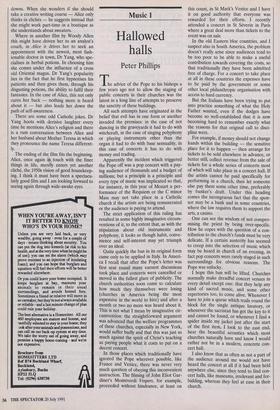Music 1
Hallowed halls
Peter Phillips
The advice of the Pope to his bishops a few years ago not to allow the staging of public concerts in their churches was the latest in a long line of attempts to preserve the sanctity of these buildings.
All such attempts have originated in the belief that evil has in one form or another invaded the premises: in the case of not dancing in the graveyards it had to do with witchcraft, in the case of singing polyphony or playing instruments other than the organ it had to do with base sensuality, in this case of concerts it has to do with . money and trading.
Apparently the incident which triggered the Pope off was a pop concert with a pay- ing audience of thousands and a budget of millions; but a principle is a principle and every type of music was implicated so that, for instance, in this year of Mozart a per- formance of the Requiem or the C minor Mass may not take place in a Catholic church if the artists are being remunerated or the audience is paying to attend.
The strict application of this ruling has resulted in some highly imaginative circum- ventions of it, to the extent that, as with the stipulation about old instruments and polyphony, it looks as though habit, conve- nience and self-interest may yet triumph over an ideal.
Quite quickly the ban in its original form came only to be applied in Italy. In Ameri- ca I recall that after the Pope's letter was first sent round many earnest discussions took place and concerts were cancelled or moved in the fullest glare of publicity. The church authorities soon came to calculate how much they themselves were losing (churches in America being the most expensive in the world to hire) and after a month or two no more was heard about it. This is not what I mean by imaginative cir- cumvention: the straightforward argument was advanced that the welfare programmes of these churches, especially in New York, would suffer badly and that this was just as much against the spirit of Christ's teaching as paying people what it costs to put on a decent concert.
In those places which traditionally have ignored the Pope wherever possible, like France and Venice, there was never very much question of obeying this inconvenient instruction. The filming of John Eliot Gar- diner's Monteverdi Vespers, for example, proceeded without hindrance, at least on this count, in St Mark's Venice and I have it on good authority that everyone was rewarded for their efforts. I recently attended a concert in St Severin in Paris where a great deal more than tickets to the event was on sale.
In the old Eastern bloc countries, and I suspect also in South America, the problem doesn't really arise since audiences tend to be too poor to be able to make a useful contribution towards covering the costs, so that traditionally they have been admitted free of charge. For a concert to take place at all in these countries the expenses have to be paid by the government or some other local philanthropic organisation with access to hard currency.
But the Italians have been trying to put into practice something of what the Holy Father wanted, even if the dodges have become so well-established that it is now becoming hard to remember exactly what the reasons for that original call to disci- pline were.
For example, if money should not change hands within the building — the sensitive place for it to happen — then arrange for tickets to be sold elsewhere in advance, or better still, collect revenue from the sale of tickets for a whole series of concerts most of which will take place in a concert hall. If the artists cannot be paid specifically for performing in a church, then let someone else pay them some other time, preferably by banker's draft. Under this heading comes the incongruous fact that the spon- sor may be a bank and in some countries, where the law requires them to support the arts, a casino.
One can see the wisdom of not compro- mising the priest by being over-specific. How he copes with the question of a con- tribution to the church's funds must be very delicate. If a certain austerity has seemed to creep into the selection of music which may be heard in church of an evening, in fact pop concerts were rarely staged in such surroundings for obvious reasons. The Pope was unlucky.
I hope this ban will be lifted. Churches normally make dreadful concert venues in every detail except one: that they help any kind of sacred music, and some other repertories too, to come alive. Whenever I have to join a queue which trails round the block for the single antique lavatory, or whenever the sacristan has got the key to it and cannot be found, or whenever I find a spider inside my jacket just after the start of the first item, I look to the east end, hear the beautiful acoustics which most churches naturally have and know I would rather not be in a modern, concrete con- cert hall.
I also know that as often as not a part of the audience around me would not have heard the concert at all if it had been held anywhere else, since they tend to find con- cert halls, like museums, irrelevant and for- bidding, whereas they feel at ease in their church.


















































 Previous page
Previous page